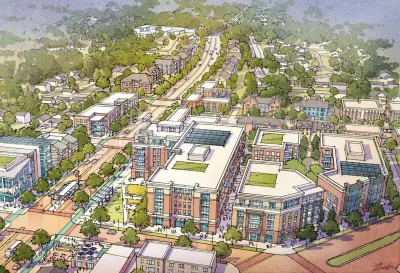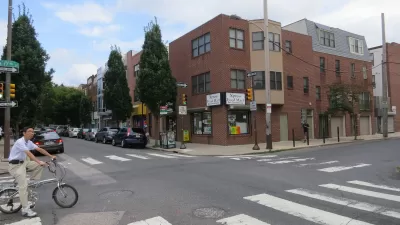A tour de force of reporting documents the efforts of suburban Maryland residents to oppose new developments in their neighborhoods.

An article written by Ally Schweitzer and published by DCist earlier this week has produced a detailed, feature-length documentation of the current state of planning in the state of Maryland. It's a story about local veto power holding proposals for new residential density at bay using a variety of legal and political tools that will be familiar to planners in many expensive, growing metropolitan areas around the country.
The story starts in 2011 at a hearing of the Montgomery County Planning Board in Silver Spring, Maryland, when residents of the Seven Oaks Evanswood Citizens Association gathered to oppose a proposed development of 76 townhomes on the former location of a private school.
“We invested in a single-family home neighborhood,” testified a homeowner. “If we wanted townhouses to be a part of that equation, we would have purchased elsewhere.”
Schweitzer sums up the conflict to tie the example to the ongoing push and pull of planning politics around the region and the country.
"Fights like this play out every day in cities and suburbs across the country. But in the D.C. region, where local governments are struggling to address a severe housing shortage that is driving up prices, elected officials are under growing pressure to push back against civically engaged homeowners who mobilize against new housing construction," writes Schweitzer.
Planetizen's archive supports that narrative: where planners and some politicians have gained major traction in recent years, implementing zoning reforms that would have been unthinkable in earlier decades. At the same time, local groups, some that can be rightly described as NIMBYs, are finding new ways to wield political power in preventing the trend toward new density.
The political conflict surrounding new density is especially salient in 2022 as the county considers approval of the Thrive Montgomery 2050 plan, a long-range general plan in the works since 2020. "Resistance to the plan, called Thrive Montgomery 2050, is loud and persistent. County council members — most of whom are either up for re-election or running for other elected offices this year — have responded by holding additional hearings and delaying a vote on the plan by several months," writes Schweitzer.
Schweitzer's deep coverage of the issue cites numerous experts, data, and analysis of the motivations of the "neighborhood defenders" who have wielded their local veto so effectively over the years. The article promises to stand next to Kim-Mai Cutler's seminal documentation of similar political power in the San Francisco Bay Area, published by TechCrunch almost exactly eight years ago. The challenges described by Cutler and Schweitzer have only deepened in San Francisco and D.C and spread to new corners of the country. Look for more definitive works like these soon.
FULL STORY: In Montgomery County, ‘Neighborhood Defenders’ Fight To Maintain The Suburban Status Quo

Planetizen Federal Action Tracker
A weekly monitor of how Trump’s orders and actions are impacting planners and planning in America.

Maui's Vacation Rental Debate Turns Ugly
Verbal attacks, misinformation campaigns and fistfights plague a high-stakes debate to convert thousands of vacation rentals into long-term housing.

Cuomo Is the Candidate of Both NIMBYs and Developers. What Gives?
In the New York City mayoral race, odd bedfellows align to preserve the housing status quo.

San Antonio and Austin are Fusing Into one Massive Megaregion
The region spanning the two central Texas cities is growing fast, posing challenges for local infrastructure and water supplies.

Charlottesville Temporarily Has No Zoning Code
A judge ordered the Virginia city to throw out its newly revised zoning code, leaving permitting for new development in legal limbo.

In California Battle of Housing vs. Environment, Housing Just Won
A new state law significantly limits the power of CEQA, an environmental review law that served as a powerful tool for blocking new development.
Urban Design for Planners 1: Software Tools
This six-course series explores essential urban design concepts using open source software and equips planners with the tools they need to participate fully in the urban design process.
Planning for Universal Design
Learn the tools for implementing Universal Design in planning regulations.
Heyer Gruel & Associates PA
JM Goldson LLC
Custer County Colorado
City of Camden Redevelopment Agency
City of Astoria
Transportation Research & Education Center (TREC) at Portland State University
Jefferson Parish Government
Camden Redevelopment Agency
City of Claremont





























